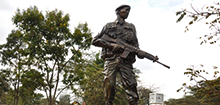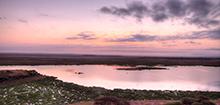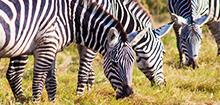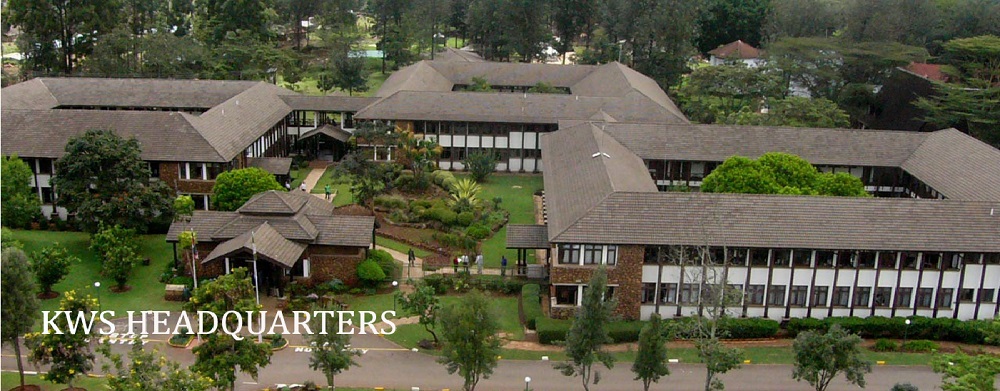The Kenya Wildlife Service (KWS) conserves and manages Kenya’s wildlife for the Kenyan people and the world.
It is a state corporation that was established by an Act of Parliament (Cap 376), now repealed by WCMA (2013), with the mandate to conserve and manage wildlife in Kenya, and to enforce related laws and regulations.
KWS undertakes conservation and management of wildlife resources across all protected areas systems in collaboration with stakeholders. It is our goal to work with others to conserve, protect and sustainably manage wildlife resources. The community wildlife program of KWS in collaboration with others encourages biodiversity conservation by communities living on land essential to wildlife, such as wildlife corridors and dispersal lands outside parks and reserves. The premise is that " if people benefit from wildlife and other natural resources, then they will take care of these resources.”
Vision
To conserve Kenya’s wildlife and its habitats for posterity.
Mission
To sustainably manage Kenya’s wildlife and it’s habitats for the benefit of nature and humanity.
Core Values
“Passion, Professionalism, Innovation, and Quality”
KEY PILLARS
Conservation: Commitment to conservation leadership
Collaboration: Enhance partnerships with stakeholders
Enterprise: Develop mechanisms for financial sustainability
SERVICE DELIVERY
We shall provide our customers with:
High quality and secure parks.
Wildlife conservation education - publication and information about wildlife in a form suitable for and accessible to all.
Sustainable wildlife population.
Protection of agriculture and animal husbandry against destruction of wildlife.
Data and information service to scientific, advisory and consultancy organizations involved in wildlife conservation.
Professional services in a friendly, responsive and professional environment.
WHAT WE DO
Formulate policies regarding the conservation, management and utilisation of all types of fauna and flora (excluding domestic animals).
Manage national parks and game reserves.
Provide wildlife conservation, education and extension services to create public awareness and support for wildlife policies.
Strive to achieve the competence and fairness in the care and development of the parks and reserves through conduct of research, deliberate acquisition, use and dissemination of relevant information from research and other sources.
Administer and coordinate international protocols, conventions and treaties regarding wildlife in all its aspects.
Our Customers
Our customers may be involved or participate in or represent any or all of the critical areas of tourism such as recreation, marine and conservation. They include:
Individuals, groups, governments and private organisations that use the national game parks and reserves for tourism, recreation, and research.
Individuals, groups or organisations that have any level of interest in or impact on the development and conservation of wildlife.
Mandate
- Conserve and manage national parks, wildlife conservation areas, and sanctuaries under its jurisdiction;
- Provide security for wildlife and visitors in national parks, wildlife conservation areas and sanctuaries;
- Set up a county wildlife conservation committee in respect of each county;
- Promote or undertake commercial and other activities for the purpose of achieving sustainable wildlife conservation;
- Collect revenue and charges due to the national government from wildlife and, as appropriate, develop mechanisms for benefit sharing with communities living in wildlife areas;
- Develop mechanisms for benefit sharing with communities living in wildlife areas;
- Advise the cabinet department on matters pertaining to wildlife policy, strategy and legislation.
- Coordinate the preparation and implementation of ecosystem plans;
- Prepare and implement national park management plans;
- Assist and advise in the preparation of management plans for community and private wildlife conservancies and sanctuaries;
- Undertake and conduct enforcement activities such as anti- poaching operations, wildlife protection, intelligence gathering, investigations and other enforcement activities for the effective carrying out of the provisions of this act;
- Conduct and co-ordinate, all research activities in the field of wildlife conservation and management and ensure application of research findings in conservation planning, implementation and decision making;
- Advise the national land commission, the cabinet secretary and the council on the establishment of national parks, wildlife conservancies and sanctuaries;
- Promote and undertake extension service programmes intended to enhance wildlife conservation, education and training;
- Identify user rights and advise the cabinet secretary thereon;
- Grant permits;
- Establish forensic laboratories.








